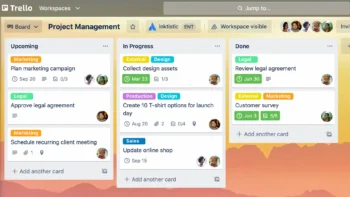Insurance verification can feel like a behind-the-scenes operation, but for patients, it’s often a source of stress, confusion, and surprise bills. Helping patients understand what’s happening, why it matters, and what they need to do can go a long way toward creating a more transparent and positive experience at your practice. Here’s how to bring patients into the insurance … [Read more...] about Bringing Patients Into the Loop: Communicating and Managing the Insurance Verification Process
articles
What Is Trello—And How Can It Help You Run Your Medical Office More Smoothly?
When you’re managing a busy medical office, you need more than sticky notes and mental checklists to keep everything organized. Enter Trello and similar project management tools. If you’ve heard the name but never had time to dig in, here’s a quick rundown of what Trello is—and why it could become one of your favorite office tools. What Is Trello? Trello is a digital task … [Read more...] about What Is Trello—And How Can It Help You Run Your Medical Office More Smoothly?
How to Use Trello to Organize the Front Desk
This Trello board is designed to help your front desk team stay organized, focused, and on top of daily responsibilities. By breaking tasks into clear categories and using visual cues, this tool gives you an at-a-glance view of what needs attention, what’s in motion, and what’s been completed. Each list represents a stage in your workflow, and cards within the lists represent … [Read more...] about How to Use Trello to Organize the Front Desk
AI in medical office management: Leveraging technology for enhanced efficiency
In the ever-evolving landscape of healthcare, medical office managers find themselves at the forefront of integrating innovative technologies to streamline operations, improve patient care, and optimize administrative workflows. Among these advancements, Artificial Intelligence (AI) stands out as a transformative tool that is already playing a significant role in various … [Read more...] about AI in medical office management: Leveraging technology for enhanced efficiency
How to Streamline the Hiring Process with Technology
Recruiting the right people is essential to maintaining a successful and efficient medical office. However, traditional hiring processes often involve time-consuming steps that can leave both managers and candidates feeling frustrated. In today’s fast-paced environment, utilizing technology to streamline hiring can make your process faster, more organized, and more engaging for … [Read more...] about How to Streamline the Hiring Process with Technology
Good Things to Work on in June: A To-Do List for Medical Office Managers
June can be a unique month in a medical office. The school year is winding down, patients are beginning to schedule around summer vacations, and your staff may be looking ahead to time off. While the pace might shift slightly, this month presents a golden opportunity to catch your breath and get ahead. Here are ten smart projects to tackle in June that will keep your medical … [Read more...] about Good Things to Work on in June: A To-Do List for Medical Office Managers
Employee retention: An important art for every office
By Dr. Steve M. Cohen I write so much about widespread employee issues, lawsuits, and "mess management" that I sometimes sound as if I don't value employees. The reality is that good employees are a treasure. That's often especially true in a medical office. But it's also worth noting that reports by a national management company found that more than 60 percent of … [Read more...] about Employee retention: An important art for every office
9 things to know about billing software
The large majority of medical offices use billing software. If you haven't made the leap to billing software yet, or if you are shopping for a new software vendor, here are things to know. With billing software, you can automate the entire billing process, from sending out invoices to processing payments. This can save you a lot of time and reduce the risk of errors. This … [Read more...] about 9 things to know about billing software
Marketing your medical practice: Strategies for office managers
Marketing your medical practice might feel like a big task, but with the right strategies, you can help your practice grow and stand out in a competitive market. Let’s explore some key marketing tactics you can implement to boost visibility and build trust with your patients. 1. Build an Online Presence In today’s world, a strong online presence is non-negotiable. If your … [Read more...] about Marketing your medical practice: Strategies for office managers
Keep those payables paid with efficient procedures
Managing your medical office's financial obligations effectively not only ensures the smooth operation of your practice but also upholds its financial integrity. Here are the steps to establish efficient accounts payable procedures that help maintain financial stability, ensure compliance, and build strong vendor relationships. 1. Develop a Clear Accounts Payable Policy: … [Read more...] about Keep those payables paid with efficient procedures









